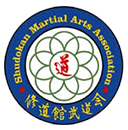Once we have achieved some degree of understanding of our martial arts skills, we can apply them in action. In judo, this is done in randori (free practice), in karate-do we engage in kumite (sparring), in iaido, we simply repeat our forms again and again, seeking to deepen our ability to focus on and execute the detailed form requirements.
Through this application, we learn what works well and what needs more work. We can go back to the mastery stage to analyze and perfect skills that don't work well in application, try them out again, and continue this back-and-forth process until we succeed at throwing a challenging partner (or whatever our milestone is at the time). This eventually makes us very capable at self-defense, demonstrating, kumite, or whatever our goal for training may be.
Having good training partners is critical for success in application of techniques. Dojo mates who care about your success can make all the difference. They will apply their strength in the right measure so that you can attempt your technique and determine whether or not it works. They can comment on how your technique looks or feels to them, allowing you to use the feedback to make yourself better. As you improve, they can increase their strength and speed, helping you to refine your skills even more. There are very few better friends than a really good training partner.
Embrace Budo at a National Karate Association
Interested in learning more about budo and its training techniques?
SMAA is a national karate association, but also offers aikido, iaido, judo, and jujutsu! Whether you’re brand new to martial arts or a seasoned veteran, all dedicated martial artists have a place at SMAA. To get started, call (734) 720-0330 or submit a contact form here.












